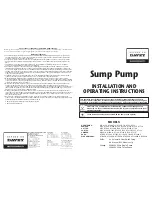
Troubleshooting
7
SYMPTOM
POSSIBLE CAUSE(S)
CORRECTIVE ACTION
Motor not running
Motor protector tripped.
Allow motor to cool. Make sure pump is completely submerged (see
Page 4). Clear debris from volute and impeller. Check for high amp draw.
Open circuit breaker or blown fuse.
Replace fuse or reset breaker.
NOTE:
if circuit breaker opens repeatedly,
don’t reset it. Call a licensed electrician.
Impeller clogged or binding.
Check amp draw. If it is more than twice the nameplate amps, the
impeller is locked. Bearings and shaft may be damaged. DISCONNECT
POWER, clear debris from volute, impeller, and cutter as needed.
Cutter or cutter ring dull or worn.
DISCONNECT POWER, pull pump and inspect cutter and cutter ring.
Replace if worn or dull.
Power cable damaged.
Resistance between power cable and ground should be infinity. If any
reading is less than infinity, call a licensed electrician.
Bad control panel.
Inspect control panel wiring. Call a licensed electrician.
Defective liquid level switch.
With switch disconnected from power, check continuity through switch
while activating liquid level switch. Replace switch if necessary.
Not enough liquid in wet well to
Allow the liquid to rise several inches above the switch-on level.
activate controls.
Liquid level cords tangled
Untangle cords for free operation.
Automatic controls defective
Try running pump in manual mode. If it runs, the automatic control is
at fault.
Pump runs
Liquid level control cords tangled
Untangle cords for free operation.
continuously
Pump is airlocked.
Stop pump for about one minute, then restart. Repeat stopping and starting
until the airlock clears. If the airlock persists, DISCONNECT POWER, pull
the pump and drill a 1/8” hole in the discharge pipe between the pump
discharge and the check valve.
Flow in matches or exceeds the
A larger pump or more pumps may be needed.
pump’s capacity.
Little or no effluent
Check valve plugged, stuck shut, or
Make sure check valve is installed correctly (flow arrow should point
delivered from
installed backwards.
away from pump) and functioning correctly.
pump
System head excessive.
Consult dealer.
Pump suction plugged.
DISCONNECT POWER, pull pump, inspect, and clear as needed.
Wrong voltage or not wired correctly.
Check pump’s rotation; check nameplate voltage against supply voltage
(they must match); consult a licensed electrician.
Pump is air locked.
Stop pump for about one minute, then restart. Repeat stopping and starting
until the airlock clears. If the airlock persists, DISCONNECT POWER, pull
the pump and drill a 1/8” hole in the discharge pipe between the pump
discharge and the check valve.
Worn or damaged impeller
DISCONNECT POWER, pull pump and inspect impeller.
Replace if necessary.
Liquid level controls incorrectly
Reposition or replace as necessary.
installed or defective.
Pump cycles
No discharge check valve installed
Install discharge check valve.
constantly
Discharge check valve stuck open.
Repair or replace check valve as necessary.
Sewage wetwell too small.
Consult dealer.
Liquid level controls incorrectly
Reposition or replace as necessary.
installed or defective.
Pump too small for inlet flow.
Consult dealer about larger pump or second pump.
Hazardous voltage. Can shock, burn, or
kill. Disconnect power before attempting any service or
repair work on pump.
Hazardous cutters and unexpected starts
which can cause loss of fingers. Keep hands away from
pump suction inlet when working on or servicing pump.






























